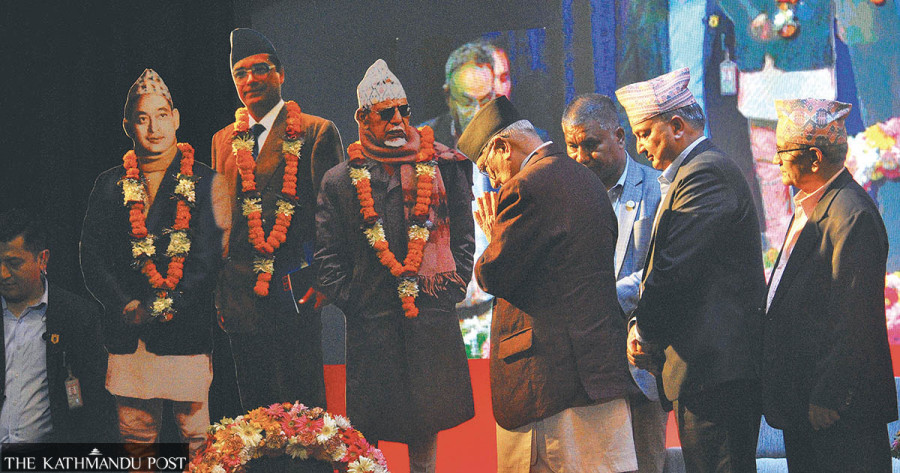Politics
Nepal’s communist leaders harp on unity—but often trade barbs
At Nepal Communist Party’s 76th anniversary event, Oli and Dahal make scathing criticisms of each other.
Post Report
When Nepal’s communist parties on Tuesday marked the 76th anniversary of the establishment of the communist movement in the country, it could be a moment of self-reflection, course correction and unity. But that was not to be.
Going by the public statements made by top communist party leaders, their rivalry is only growing. And there’s no room for compromise and conciliation.
The centre of the attack was Prime Minister KP Sharma Oli, chairman of the CPN-UML. But Oli is always on the offensive. He spared no effort in attacking rival communist leaders, chiefly the former prime minister and CPN (Maoist Centre) chair Puhspa Kamal Dahal, and Madhav Kumar Nepal, another ex-PM and chairman of the CPN (Unified Socialist).
During his address, Oli defended the coalition government he leads and attacked party leaders, mostly those from the leftist background, external forces and the media. He made a veiled attack on Madhav Nepal, who once led the UML but quit it in 2021 to form his own party after a tussle with Oli.
Without naming, Oli accused “criminals” of attacking the good works carried out by his government.
The UML is under attack from all sides but if someone thinks of a nation without the UML and UML without Oli, that won’t happen, the prime minister said.
“Criminals are crowding around those who are doing good work. The opposition is organising against us. Even some of our own comrades suspect if the opposition is right. A few of our own comrades have been caught in this confusion,” said Oli.
“Various foreign powers have refused to support our party. At such times, questions are raised about whether our leadership has done something wrong. We are targeted with criticism. Now the question arises—should we find a leader who will never be criticised?” said Oli.
The prime minister also claimed that if he were to compromise, he could easily become highly popular within a month.
Oli, who became the prime minister in July last year, is now confronting several crises. On Monday, Education Minister Bidhya Bhattarai resigned after Oli declined to accommodate the demands of the agitating teachers.
Thousands of agitating teachers have been on the streets in Kathmandu for three weeks, demanding the School Education Act, among other things.
The resignation of the education minister, that of the vice-chancellor of Tribhuvan University, the removal of Kulman Ghising as the managing director of Nepal Electricity Authority, manoeuvrings in the appointment of Nepal Rastra Bank governor and failure to appoint office bearers in important constitutional bodies have made this fourth Oli administration an “intercourse of mafias and intermediaries”, said political analyst Mumaram Khanal. “This is going to collapse,” he added.
The government has also failed to appoint the governor of Nepal Rastra Bank and got into one after another controversy. The government also forcefully removed Ghising, four months before his term ended. Citing non-cooperation from the prime minister, who is also the chancellor of Tribhuvan University, Vice-chancellor Prof Keshar Jung Baral resigned from the post recently.
On Bhattarai, Oli remarked that she resigned as education minister citing health reasons. Criticising media reports, the prime minister said their headlines were directed against him.
“One minister resigned. Why? Apparently because the prime minister didn’t let her work,” he said. “She had a throat surgery. Things didn’t go well, she couldn’t continue, and she resigned. But all the headlines are against me. It looks like everyone sat down together and made the narrative. It’s as if they passed a resolution, made phone calls, and planned it out.”
Regarding Arzu Rana’s meetings and Sher Bahadur Deuba’s visit to Thailand, Oli claimed that rumours were being spread against the government.
After 15 months, the reins of power will be handed over to Deuba, Oli said.
CPN (Maoist Centre) chair Dahal made it clear that Oli has lost his legitimacy to become the prime minister. Oli has lost the moral ground to govern, he said.
“Rather than addressing the demands of teachers, the prime minister is humiliating, abusing and reprimanding them,” said Dahal, speaking at a function organised to mark the communist party day.
Dahal also urged the teachers not to stop the agitation because they had been betrayed several times in the past.
Nepal’s fragmented communist forces together enjoy a two-thirds popular support but the communist movement has been beset by divisions, conflicts and confrontations.
But Dahal said that he had still not given up on uniting Nepal’s communist parties. Two largest communist parties came together and formed a strong communist party in 2018 but this unity did not last more than three years. It broke into several pieces in 2021.
“I put forward a proposal for party unity. However, it was not successful due to opportunism and individualism [of some],” Dahal said. “However, we are not tired of making an effort. We have not abandoned the goal of a unified communist movement, nor will we give it up.”
Dahal insisted that the responsibility of uniting true communists lay on his shoulders.
Speaking at a different function, CPN (Unified Socialist) General Secretary Ghanshyam Bhusal said that the CPN (Maoist Centre) has not been able to shed its greed for power. The Maoist Centre is in favour of removing the current UML-led government and forming one led by the Congress, said Bhusal.
The prime minister is facing public ire and people are chanting slogans against the prime minister, Bhusal, who was a senior UML leader until 2022, said.
Bhusal also criticised the UML’s upcoming rally. Under the banner of ‘Youth Festival’, the ruling party wants to show its organisational prowess by mobilising youth in Kathmandu on Thursday.
April 24 marks Loktantra Diwas, the day King Gyanendra’s direct rule ended in 2006, after the success of the second people’s movement.




 18.12°C Kathmandu
18.12°C Kathmandu














